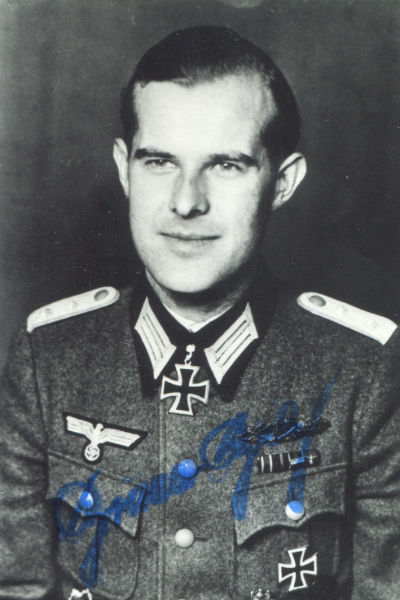Belz, Bruno (Panzergrenadier-Regiment 25)
- Date of birth:
- June 5th, 1916 (Sellnow/West Pommerania, Germany)
- Date of death:
- February 8th, 1991 (Munich/Bavaria, Germany)
- Nationality:
- German
Biography
Bruno Belz reached the rank of Hauptmann
Do you have more information about this person? Inform us!
- Period:
- Second World War (1939-1945)
- Period:
- Second World War (1939-1945)
- Awarded on:
- November 9th, 1940
- Period:
- Second World War (1939-1945)
- Period:
- Second World War (1939-1945)
- Period:
- Second World War (1939-1945)
- Period:
- Second World War (1939-1945)
- Rank:
- Oberfeldwebel (Warrant Officer)
- Unit:
- Stabskompanie, Panzergrenadier-Regiment 25, 12. Panzer-Division
- Awarded on:
- March 6th, 1943
- Period:
- Second World War (1939-1945)
- Awarded on:
- July 30th, 1943
- Period:
- Second World War (1939-1945)
- Awarded on:
- December 12th, 1944
- Period:
- Second World War (1939-1945)
- Rank:
- Oberleutnant (1st Lieutenant)
- Unit:
- Chef, 3. Kompanie (gep.), Panzergrenadier-Regiment 25, 12. Panzer-Division
- Awarded on:
- December 27th, 1944
- Period:
- Second World War (1939-1945)
- Rank:
- Oberleutnant (1st Lieutenant)
- Unit:
- Chef, 3. Kompanie (gep.), Panzergrenadier-Regiment 25, 12. Panzer-Division
- Awarded on:
- April 30th, 1945
“On the 21.12.1944, the start of the Third Battle of Courland, the enemy penetrated the frontline south of Frauenburg. The I.(gp)/Panzergrenadier-Regiment 25 was dispatched to eliminate the penetration.
The Bataillon attacked without waiting for the still en-route friendly Panzers and heavy weapons. It was possible for the unit to eject the enemy out of Jaunserzi, Brammani and Laugali, however Gergali and the patch of forest located south of the village became heavily occupied with swiftly brought-up enemy tanks and anti-tank guns.
Oberleutnant Belz’s Kompanie was the first to make a move against Gergali. He [Belz] recognized both the enemy’s point of main effort as well as the necessity of quickly crushing the hostile intentions.
Acting on his own initiative, Belz decided to attack without either waiting for the other Kompanien or reassembling his own. His aim was to seize Gergali and force a breakthrough towards the south through the patch of forest.
Belz attacked Gergali while personally leading at the head of a Zug that had been reinforced by two cannon-armed SPWs. The enemy troops in the village were ejected, and he immediately pivoted southwards against the forest. Here he and his men began taking heavy fire from enemy tanks and anti-tank guns.
However he pressed the assault without regard for his own safety (he stood upright in his SPW), and in doing so he gave his men a true model of a brave officer. Belz attacked and ultimately broke through the forested area with just 3 SPWs and 2 cannon-armed SPWs. In the process the enemy lost 3 tanks along with multiple trucks, anti-tank guns and heavy machine-guns.
The enemy thus lost the forested area (which they had intended to use as a rallying point for additional attacks) along with the commanding homestead of Gergali. This was accomplished swiftly and with minor friendly losses. With this completed it was possible to continue the friendly attack towards the south and create a new defensive line. Such an outcome would not have been possible without the initiative and outstanding bravery of Oberleutnant Belz.
Oberleutnant Belz himself was badly wounded during this battle.”
- Period:
- Second World War (1939-1945)
- Awarded on:
- 1945
Sources
- Photo 1: Russ Nummer
- - FELLGIEBEL, W.P., Elite of theThird Reich, Helion & Company Limited, Solihull, 2003.
- PATZWALL, K. & SCHERZER, V., Das Deutsche Kreuz 1941-1945, Band II, Verlag Klaus D. Patzwall, Norderstedt, 2001.
- THOMAS, FRANZ & WEGMANN, GüNTER, Die Ritterkreuzträger der Deutschen Wehrmacht 1939-1945, Biblio-Verlag, Osnabrück, 1987.
- Ritterkreuz Verleihungsvorschlag Skizze.
- Die Ordensträger der Deutschen Wehrmacht (CD), VMD-Verlag GmbH, Osnabrück, 2002
- Die träger des Ritterkreuzes des Eiserne Kreuz 1939 - 1945
- BArch RH 7/425















